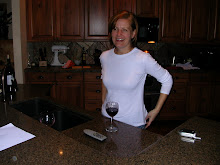I came across my surgical pathology report about a week ago while organizing my desk. I read it with interest as I had not looked at it since before the first of the year. Since then I've become familiar with some of the terminology used in pathology reports.
One of the measurements (mitoses), used in grading cancer, is the number of cancerous cells that are dividing when viewed under a high power microscope. We have known from the beginning that my cancer was rated as high for mitosis count. But this time I was taken aback by how high the number is. This lead me on an obsessive online search through medical articles and books for another example where the mitosis count was as high. I wanted reassurance that the mitosis rate was not all that unusual and that we aren't dealing with an uncontrollable force. Unfortunately what I found was documentation that made me much more concerned rather than less. Still, there was fragile underlying comfort in knowing that I am not a scientist and that I might be misinterpreting what I read.
I allowed myself to go down the effortless road of pessimism and selfishness. Looking back now, I think I was also looking for drama so that I could manipulate my loved ones into giving me attention.
After chemo last thursday Dr. Schmidt took me in to an examining room, gave me an exam and told me that a cancer marker had been steadily increasing over the past four blood tests to the point where it was a bit of a concern. She also stated that she did not find any evidence of disease in my lymph nodes and chest during the exam. She went on to say that 1/3rd of the time the increased cancer marker is a false positive caused by chemo treatment. When I told her that I was not surprised, that I have been consciously reminding myself not to rest easy and to assume that the cancer will reoccur in order to avoid being blind-sided with bad news, she grew concerned. She suggested I schedule another guided imagery session. She also decided to schedule a CT and bone scan for a couple weeks from now to look closer for evidence of disease in other parts of my body.
My brother, sister and nephew Jareth were in the chemo room when I came out and in my excitement in seeing Jareth and the wonderful company of my siblings put all thoughts of the discussion in the exam room out of my mind. My mom arrived the next morning and I happily climbed into a cocoon where nothing is expected of me and my every need is attended to, for the next two days. I slept as much as I needed while mom, once again, unselfishly worked to make our home the haven that it is. John, my ever-understanding and devoted husband kept up his arduous mission of supporting us while caring for me and the kids.
Steroid withdrawl had its normal affect on me Sunday. Pessimism and anxiety came in waves throughout the day. Several times I wanted to break down and heave my fears and anxieties onto John. At other times though, I recognized that my thoughts were extreme and wanted to protect him from them. He is so perceptive though. He encouraged me to let it all out and after not much convincing I did.
I told him that I feared my prognosis was bad and more suffering was only a matter of time. I let him know about my obsessive search for reassurance. I talked about the cancer marker news.
John bravely took on the heavy and difficult job of understanding, reassuring me that my thoughts were not, as I had labeled them, “crazy” and acknowledging the facts that we’ve known all along. But most importantly pointing out that letting myself buckle under thoughts that I inflated would take away time that I could be experiencing joy and contentment. We all have a limited amount of time to enjoy life. I am no different in that respect than any of you.
He is one of those wise people who keep a sense of humor and is pleasant and giving through the toughest of situations. When he is stressed from the frustrations of life he seeks out humor rather than pitying himself. I have learned so much from him and could not have a better partner to get through this with. Thank you sweetheart for bringing me back once again. I am optimistic today and feel no fear.



















